Crypto Can Fix the World
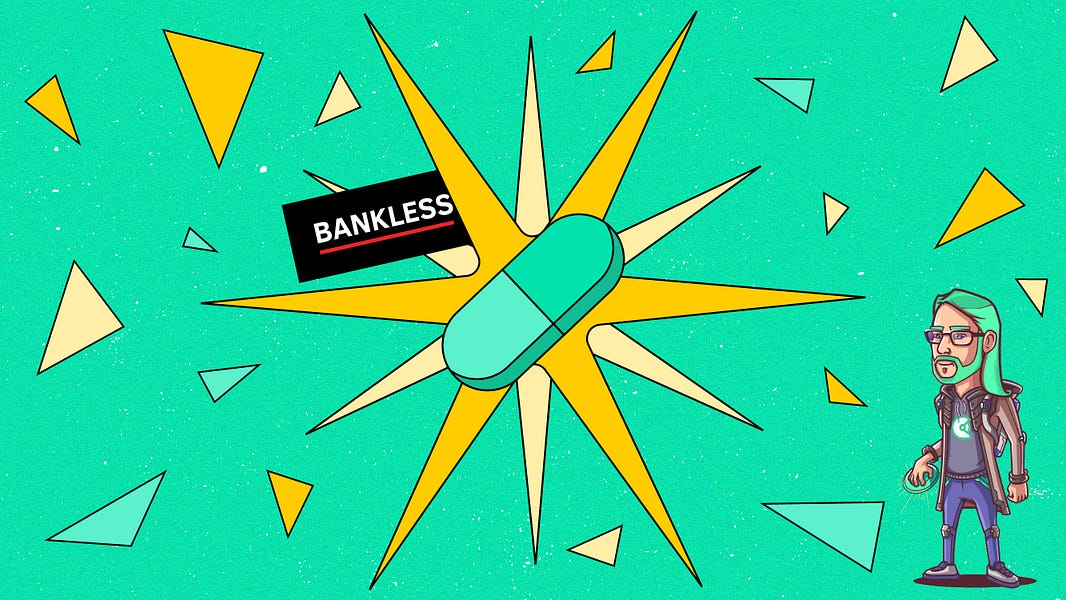
Dear Bankless Nation,
Our world faces a number of existential threats: climate change, internal political strife, external wars, wealth gap, superbugs—all problems of our own making.
How do we solve these problems?
Our institutions have failed us. We placed our faith in their ability to improve our lives, but they played politics, inflated away our future, and catered to short-term interests.
As most Bankless readers are below their mid-30s, it’s hard not to look at these problems and feel small, inadequate, and incapable. We can’t escape—these challenges will hit our generation hard.
But let me offer you an alternative to nihilism.
Take the Green Pill.
This is the future that Kevin Owocki paints. A future that rejects Doomerism. One that leverages human coordination and capital for social good.
We’ve seen a number of these experiments succeed:
- Gitcoin funding over $51m in public goods
- KlimaDAO purchasing 14m tons in on-chain carbon offsets
- Ethereum itself—a public good for the creation of public goods
Not just crypto.
Regenerative crypto.
That’s the Green Pill. Let’s explore.
- RSA
P.S. We’re launching a new podcast hosted by Kevin Owocki called Green Pill. First episode with Vitalik! Watch the trailer and subscribe on iTunes, Spotify, or RSS.
Humanity is faced with global scale coordination failures that are systemic risks to human thriving.
These coordination failures include climate change, an insecure digital infrastructure, misinformation, and a lack of economic prosperity.
Our legacy institutions are not equipped to handle them.
But, I reject the doomerism left to us by legacy institutions and generations past. I believe that we can create a Schelling point for the hopeful by creating new regenerative cryptoeconomic systems.
I believe that our moment of opportunity is here - we can build a better world for our generation and beyond. By leveraging the properties web3 has to offer, we can build more regenerative cryptoeconomic systems that create positive externalities for the world, build a more SolarPunk future, and that can slay Moloch.
With the launch of greenpill.party, GitcoinDAO is setting out on an exploration of the intersection of programmable money, game theory, & mechanism design, as well as a search for powerful new ways to fund, design, develop, & market regenerative web3-era applications and digital assets. This is a party about how crypto can regenerate the world and I invite you to join me.
The Problem: Coordination Failures
Coordination Failures occur when a group of humans could achieve a desirable outcome by working together but fail to do so because they don't coordinate their decision-making.
Coordination failures are dictator-less dystopias, situations where each citizen, including the leadership, hates the system but for lack of a good coordination mechanism, the failing system endures.
From a god's-eye view of a system that has suffered a coordination failure, there is a clear problem. From within the system, no one actor can create change.
Examples of global coordination failures are all around us:
- Climate Change
- Nuclear proliferation
- Misinformation
- Ransomware
- Cancer (a coordination failure within the human body)
- Inadequate access to education or employment
- The loss of biodiversity
Much is at stake
As humanity globalizes, our coordination problems become increasingly worldwide. At the same time, our ability to deal with these global coordination problems is being challenged. Our generation has inherited decaying infrastructure, declining faith in institutions, or establishments that are not enabled for web-scale nor for problems beyond their borders.
Each of these coordination failures creates human suffering. The scale of the impact of these coordination failures is global, but the impact is local:
- Your coastal property floods due to climate change
- An authoritarian leader is elected to power due to misinformation
- A hospital is held hostage by ransomware because of an insecure internet
Moloch: Know thy enemy
Viewed from a more visceral angle, it's almost like there is an all-powerful demon out there manipulating us to prevent our mutual success. The shared psychic manifestation of coordination failure is Moloch, the god of human coordination failure. Moloch is the reason why we can't have nice things. We name Moloch so that we may fight it.
Our weapon of choice
We need an incorruptible coordination substrate that is truly global in nature to solve global coordination failures.
We have found one. That weapon of choice is a novel mechanism design deployed to decentralized blockchain networks.
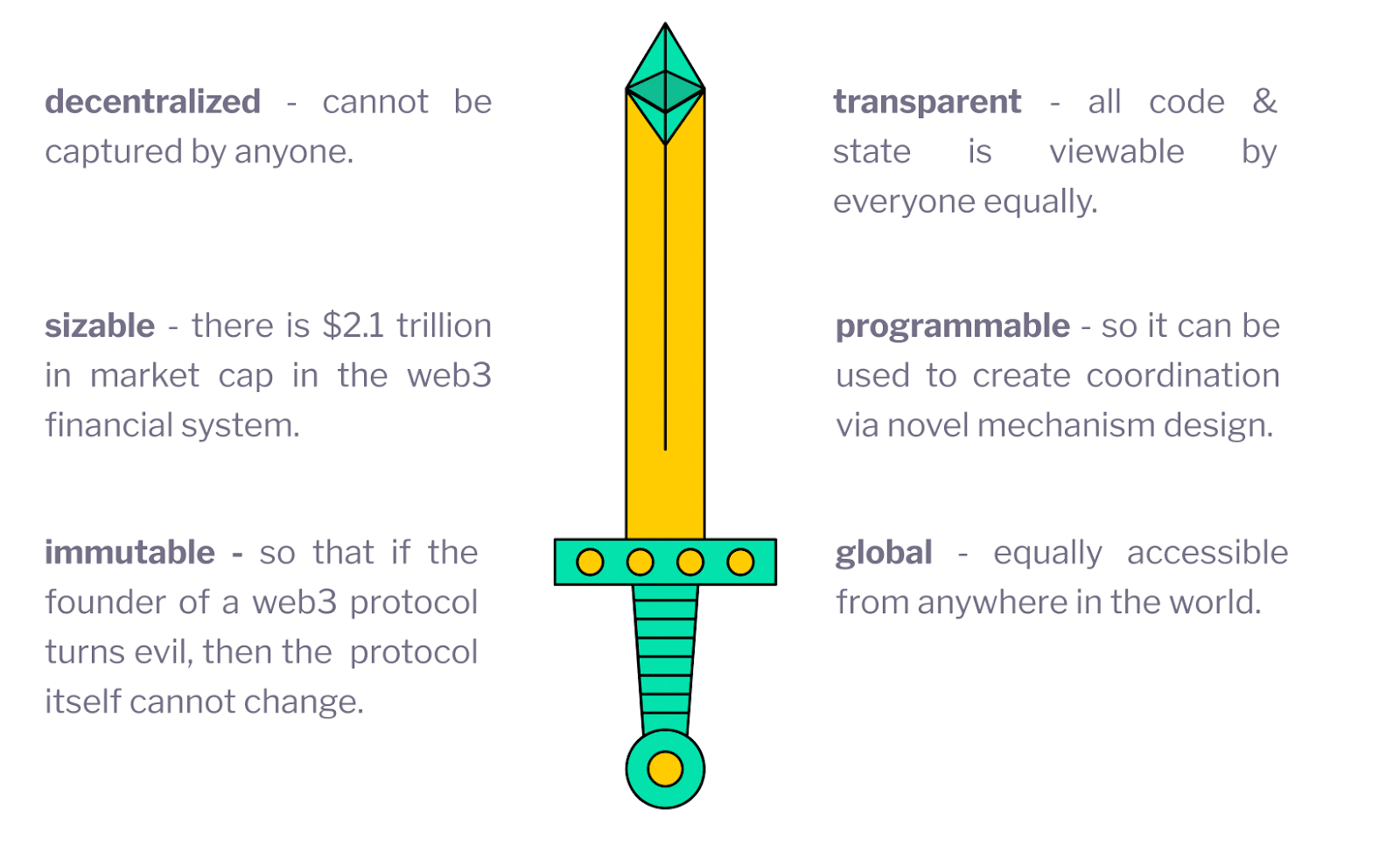
We don't have to live with coordination failures any longer.
Is it possible we could slay Moloch? Yes. Is it guaranteed? No, we need to choose it.
All coordination is a choice. We need to continuously reinforce that choice individually and build systems that reinforce that choice systematically.
Solution: Regenerative Cryptoeconomics
Regenerative CryptoEconomic systems are systems that:
- Satisfy human needs.
- Create positive externalities and are net-positive.
- Create balance and find equilibrium.
To create positive externalities we must first do no harm. The world is presently embroiled in a debate about the energy usage of Proof-of-Work (PoW) blockchain systems like Bitcoin. The carbon impact of Bitcoin and other PoW blockchains is likely both large and profoundly negative until proven otherwise. Regenerative cryptoeconomic systems are systems that are net-positive.
Luckily, there are many 2nd-generation and 3rd-generation blockchains that fit this criteria. When Ethereum switches protocols from Proof-of-Work to Proof-of-Stake in The Merge, the Ethereum network will consume 99.95% less energy it did before. Ethereum will be nearly carbon neutral at that point.
From such a foundation of near-carbon-neutrality, it is possible to create cryptoeconomic systems that are extremely net-positive.
ImpactDAOs, defined as any DAO that creates net positive externalities for the ecosystem around it, are the scalable, atomic building blocks of the Regenerative CryptoEconomic movement.
Some examples of ImpactDAOs, and the scale of positive externalities they create:
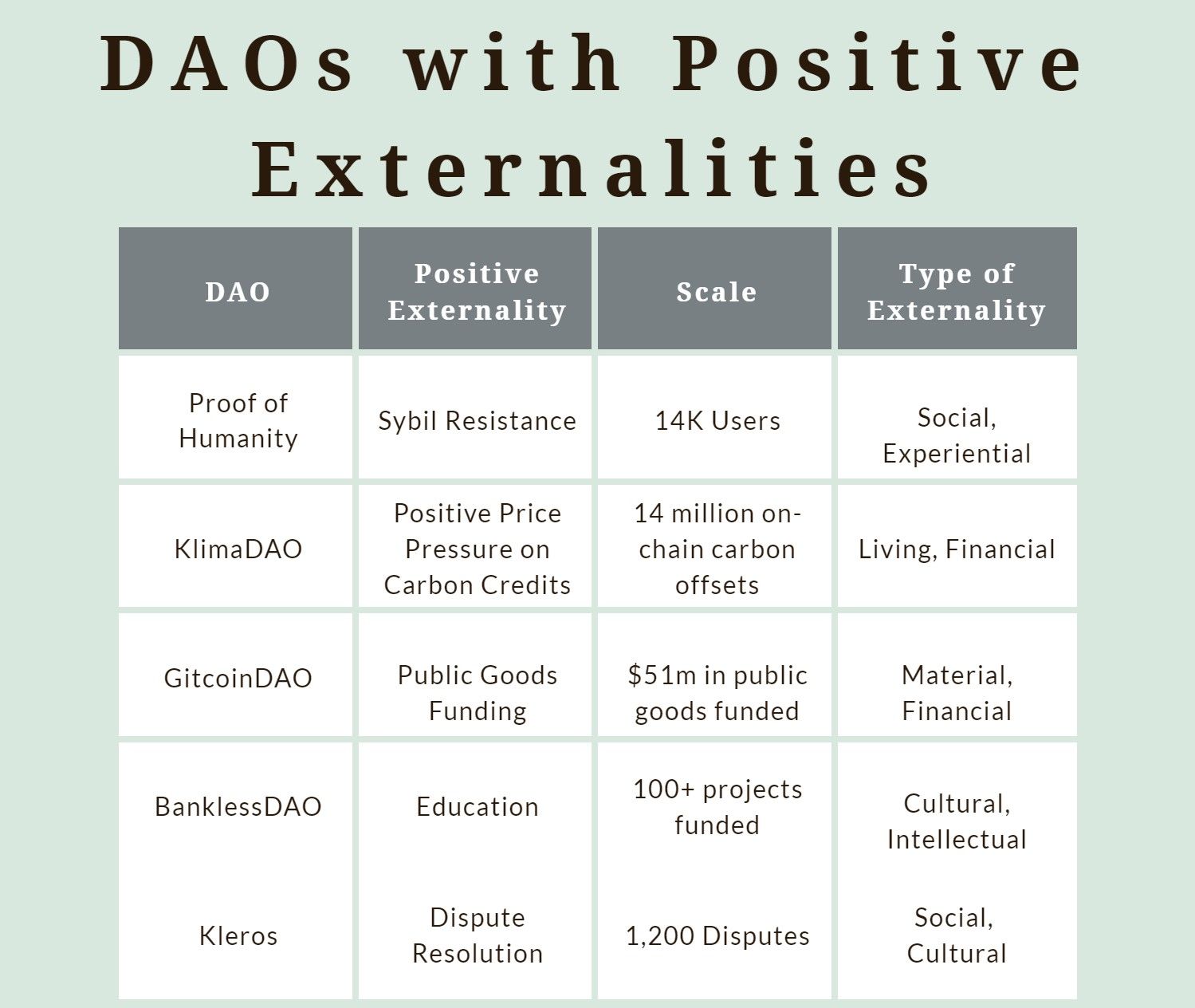
Visualizing Regenerative Cryptoeconomics
As we define Regenerative CryptoEconomics around what it is, we should also define what it is not.
Regenerative cryptoeconomics can sometimes be resilient or sustainable, but it cannot be extractive.
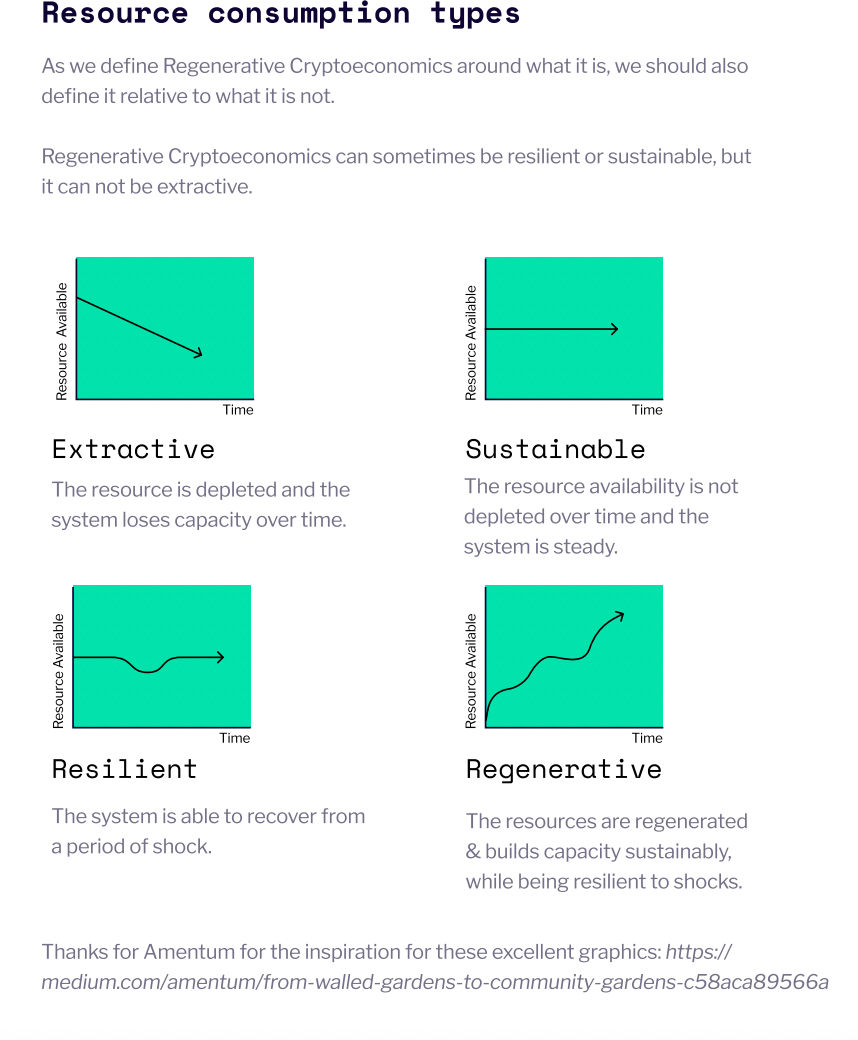
What we build for

We can design a regenerative internet of value to enable the thriving of a diverse global citizenry. One that creates human thriving for many.
Regenerative Cryptoeconomics at scale would ensure funding of digital infrastructure that is not owned by any billionaire or tech giant. By green-pilling tens of thousands of web3-native founders, engineers, designers, and onlookers we can eclipse the more prolific and more degenerative use cases of blockchain networks and ignite a positive feedback loop for their regenerative use cases.
By providing funding for the public good to homesteaders in the metaverse, Regenerative CryptoEconomics will make it more likely that the peer to peer metaverse wins.
We can program our values into our money
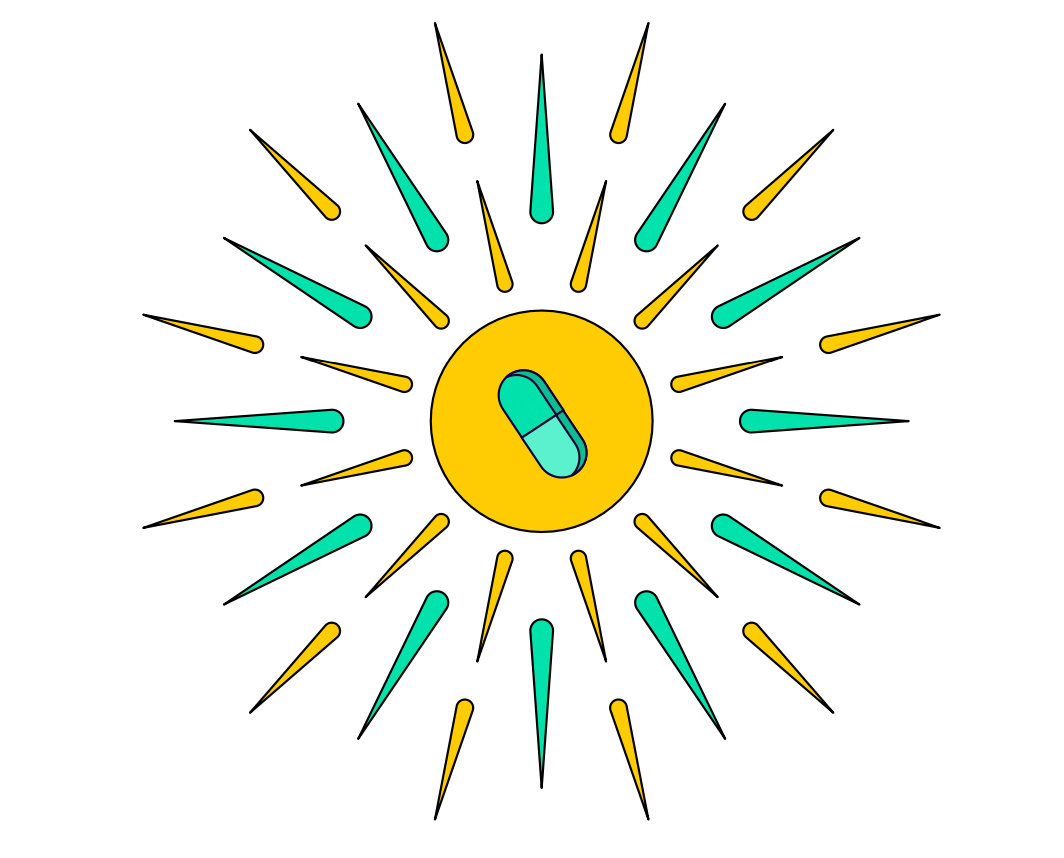
As of January 2022, the value of the open source financial system was $2.1 Trillion. What if we could use all of that capital for good?
The idea from first principles:
- There is $2.1 Trillion market cap in blockchain-based networks.
- It's all built on open source software which is a public good and something we value.
- We can redirect some of that capital to support the public good.
All of the money that used to go to some back office on Wall St. in the old financial system will now go to Open Source Software. Given the rational need to prevent black swan events (like hacks, unexpected downtime, etc.) by supporting the digital infrastructure beneath our digital assets, it should be possible to build an aqueduct to financially support the most necessary public goods.
With programmable money, we can program our values into our money and make public goods sustainable financially.
This is of course a double-edged sword as value systems can vary wildly. However, by aligning the incentives of many participants, and providing a channel for greater combinations of strength & intelligence to come together, system designers can create economies that externalize good as widely as possible.
Webscale Regenerative CryptoEconmics
The big idea is that by embracing and building regenerative cryptoeconomics we can:
- Build a parallel opt-in system for funding digital native public goods, which operates at greater efficiency at a greater scale.
- This parallel opt-in system could increasingly support non-digital public goods.
- As more people quit their private jobs to work on public good, energy in one public good seeps into another, a sense of 21st century native civic pride emerges, momentum compounds outwards in a virtuous cycle of growth.
- More global public goods get funded. Over decades, economies & democracies all over the world get upgraded to higher bandwidth for the digital age, creating more human thriving.
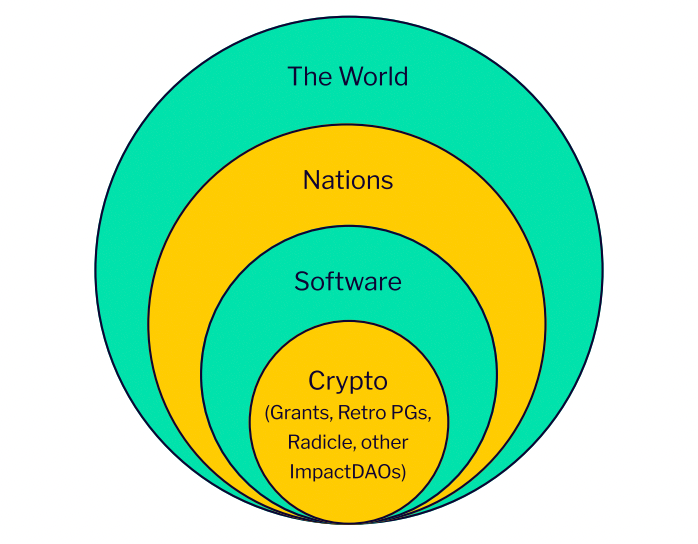
Of course, no outcome is preordained. Like any technology, cryptoeconomics can be used for the common good or strictly for personal gain. As humanity upgrades its infrastructure in the digital age, there will be many questions we must ask and seek to answer. There will be constraints to traverse.
We must coordinate to leverage our gifts + capitalize on this opportunity for the benefit of humanity at large. In the book on this topic that I just released, I dive deeper into generation and distribution mechanisms for public goods. I also state some of the unsolved problems and opportunities that we will need to address as we continue to build out a regenerative cryptoeconomic system.
Take the Green Pill
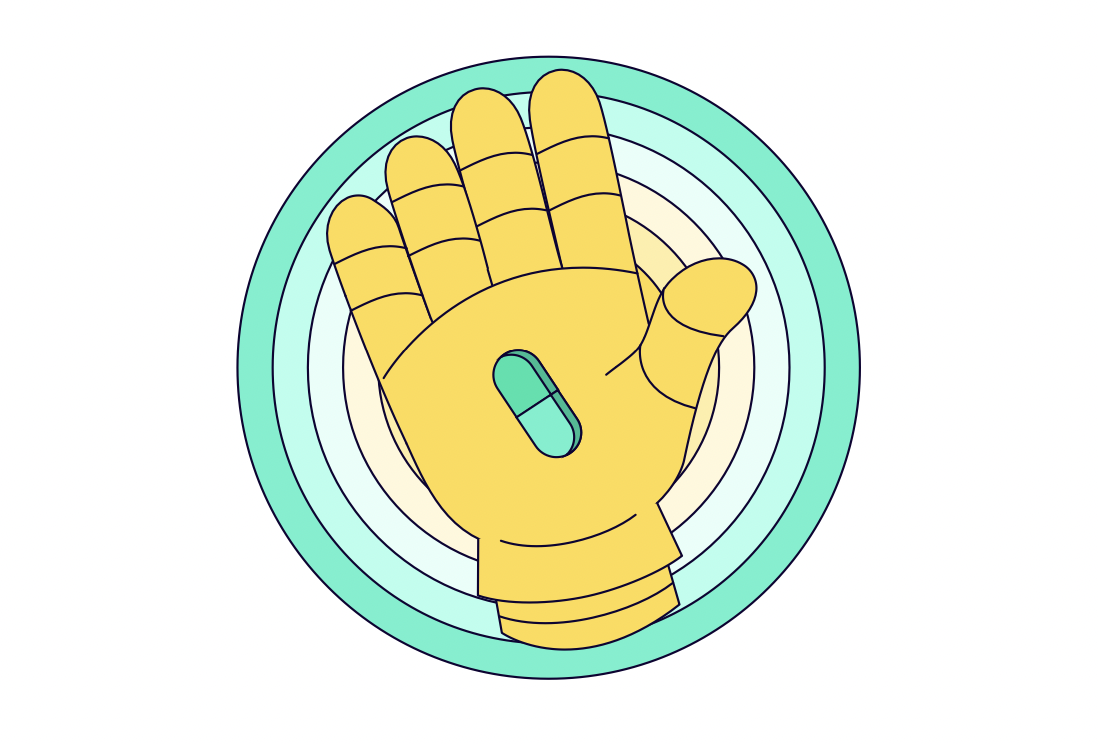
All coordination is a choice. To win this coordination game, we need to choose to coordinate to make this into a multiplayer game. Once the multiplayer game is bootstrapped, we need to choose coordination to win it. Once we win it, we must coordinate to maintain its legitimacy.
If we collectively all take the green pill (choosing to coordinate), we create a more regenerative world. If we collectively do not, we continue to maintain the status quo. Regenerative cryptoeconomics is here, it’s important, and it’s happening. But it is also inchoate. To grow, it needs you.
The Overton window is open. Join the movement. Do what your skills & abilities uniquely enable you to do. Spread the word. Build something. Learn from your mistakes & throw out & build something else. Host a meetup. Be honest about where we’re winning and also where we fall short. Do what feels right to you. Do your own research. Beware any charismatic leader who claims to have all the answers (including me). The leader is the person who knows what to do next.
If we collectively choose and persistently reinforce this outcome, as hope begets more hope and momentum begets more momentum, regenerative cryptoeconomics could become inevitable.
If you want to learn more, get the book and join the fight to slay Moloch by building a more regenerative cryptoeconomic future. You can even contribute to the next edition of Regenerative CryptoEconomics - creating the next edition of the book will be a multiplayer game.
If you will be at Schelling Point or ETHDenver, I will have some hardback copies on hand.
Whatever you do, remember to coordinate.
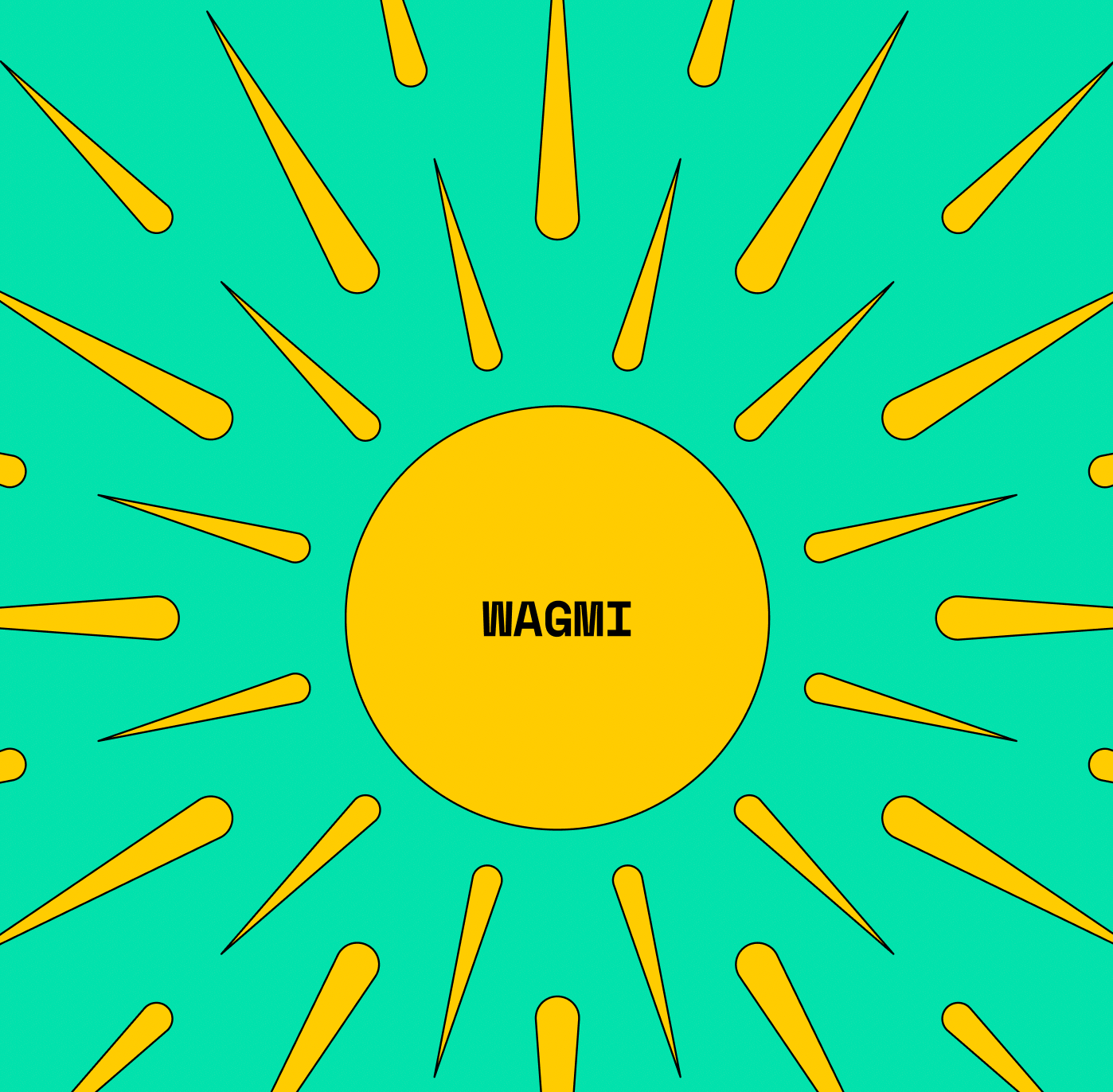
Action steps
- 📖 Git the book GREENPILLED: Regenerative CryptoEconomics
- 🤘 Make a pledge at Greenpill.party
- ✅ Watch the trailer and subscribe on Spotify and Apple Podcast
Author Bio
Kevin Owocki is the founder of Gitcoin.co — Where builders & funders come together to build the open web. Gitcoin has delivered $52mm worth of value to OSS devs in the last several years. He has a BS in Computer Science, 15 years of engineering leadership experience in Open Source Software and Web Startups. Kevin is a community organizer in the Boulder Colorado Tech Scene.